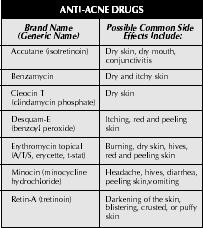Acne - Diagnosis
People with acne are often treated by family doctors. More serious cases are referred to a dermatologist (a specialist in skin disorders) or an endocrinologist (a specialist in hormonal disorders).
Because of its appearance, acne is not difficult to diagnose. A doctor takes a complete medical history, which includes questions about skin, diet, medication use, and other factors associated with risk for acne. He or she conducts a physical examination of the face, upper neck, chest, shoulders, back, and other affected areas. The doctor determines the number and type of blemishes, whether they are inflamed or not, whether they are deep or near the surface of the skin, and whether there is scarring or skin discoloration.
Laboratory tests are not done unless the patient appears to have a hormonal disorder. In that case, blood tests and other tests may be ordered. Most insurance plans cover the cost of diagnosing and treating acne.

| ANTI-ACNE DRUGS | |
| Brand Name (Generic Name) | Possible Common Side Effects Include: |
| Accutane (isotretinoin) | Dry skin, dry mouth, conjunctivitis |
| Benzamycin | Dry and itchy skin |
| Cleocin T (clindamycin phosphate) | Dry skin |
| Desquam-E (benzoyl peroxide) | Itching, red and peeling skin |
| Erythromycin topical (A/T/S, erycette, t-stat) | Burning, dry skin, hives, red and peeling skin |
| Minocin (minocycline hydrochloride) | Headache, hives, diarrhea, peeling skin, vomiting |
| Retin-A (tretinoin) | Darkening of the skin, blistering, crusted, or puffy skin |

Comment about this article, ask questions, or add new information about this topic: